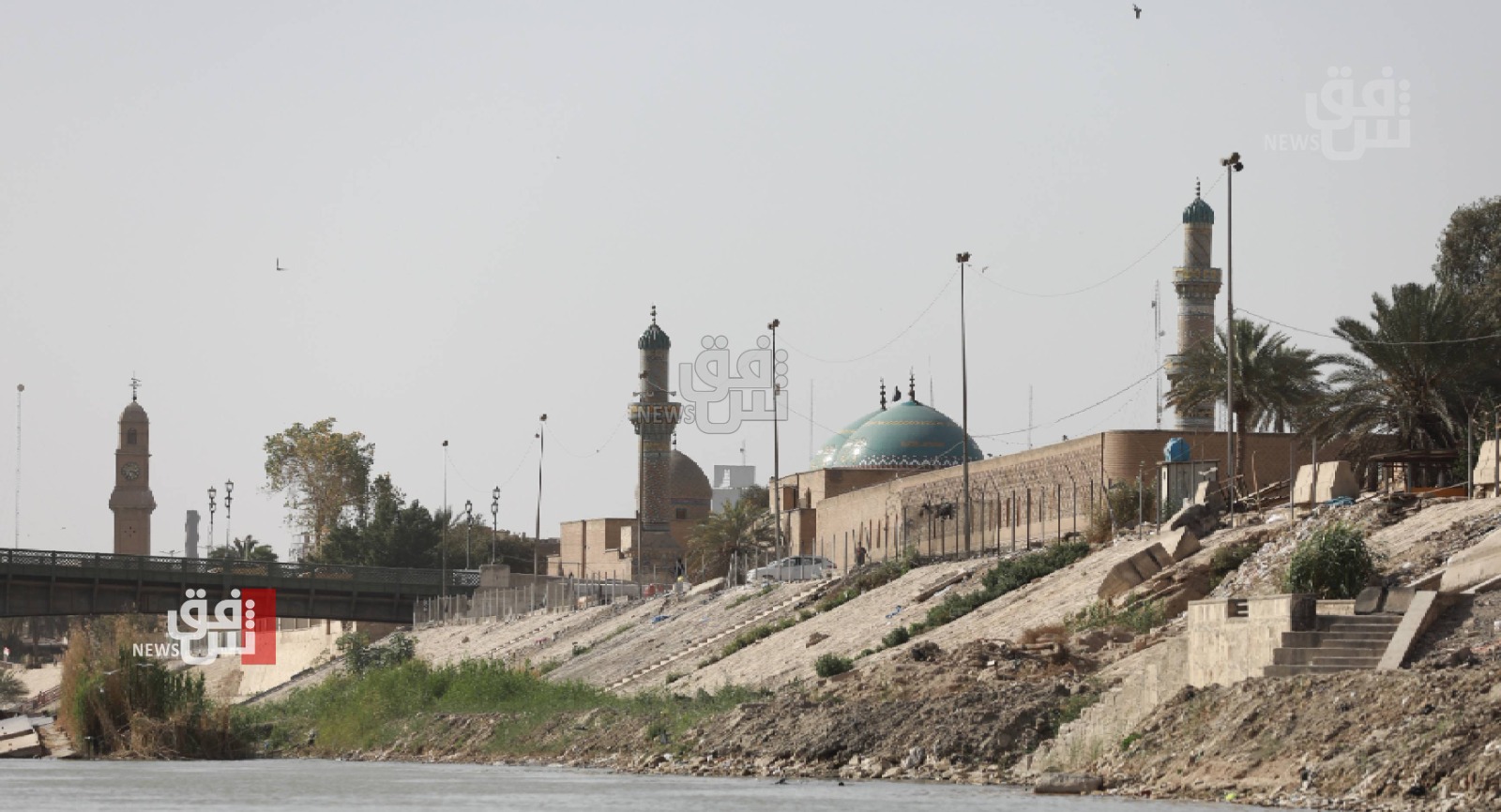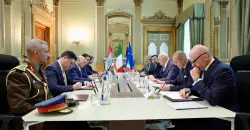Iraq braces for Turkish President's visit to tackle water crisis

Shafaq News / Iraq is facing a severe water scarcity crisis, which is being described as the most challenging since the 1930s by the Ministry of Water Resources. This crisis is significantly impacting the agricultural, livestock, and environmental sectors in the country. As a result, Iraq ranks fifth among the nations most adversely affected by the climate change crisis.
The water shortage has led to a reduction in Iraq's agricultural lands for the current summer season, particularly affecting the cultivation of "shalb" or "amber rice," a local rice variety exclusive to Iraq. The cultivated area for this rice variety has now decreased to a meager 5,000 dunams, with 3,000 in Najaf and 2,000 in Diwaniyah. This effort aims to preserve the seeds and pave the way for future cultivation.
The adverse impact on the agricultural sector can be attributed to outdated agricultural plans and persisting water waste, reflecting the absence of a comprehensive field-oriented approach to efficiently manage the sector. As a result, the agricultural state has deteriorated drastically, according to Adel al-Mukhtar, former advisor to the parliamentary agricultural committee.
Al-Mukhtar also emphasized the deteriorating condition of the livestock industry, which is still heavily reliant on primitive practices, leading to a precipitous decline in the water buffalo population. Notably, cattle stations in Latifiyah and al-Iskandariyah have been forced to cease operations, while other cattle stations are facing daunting setbacks.
In addition to the devastation among buffaloes and cattle, many fish species have succumbed to the crisis, further exacerbating the problems. Furthermore, the vast majority of Marshlands have dried up, forcing livestock breeders in the region to seek more favorable environments elsewhere. As a result, there is an urgent need to reassess agricultural policies to align with the advanced techniques and best practices adopted globally in this sector.
The spokesperson of the Ministry of Agriculture, Mohammed al-Khuzaai, stated that "the water issue is no longer a mere technical matter to be dealt with; it has transformed into a political concern due to its profound and significant crisis."
Regarding the ministry's actions in this regard, al-Khuzaai explained to the Shafaq News Agency that "there are measures to transition towards modern irrigation methods using fixed and pivot sprinklers, but these address only a portion of the problem."
He pointed out that "the fundamental issue is an escalating water scarcity for over five years, leading to the current critical water levels. This compelled the Ministry of Water Resources to make the decision to backfill unauthorized lakes to preserve water."
Al-Khuzaai emphasized the necessity of "handling water with extreme caution, as the summer season is prolonged, and rising temperatures exacerbate water consumption, both for drinking and other purposes."
He assured that "the Ministry of Agriculture's goal is to minimize the impacts on the agricultural sector, and forecasts indicate a positive change in the climate for the upcoming season. Additionally, numerous efforts are underway with Turkey to increase water releases."
In turn, Khalid Al-Shamal, the spokesperson for the Ministry of Water Resources, highlighted that the water scarcity crisis in Iraq can be attributed to three key factors:
Firstly, he pointed to the impact of climate change, which has significantly altered the region's climate patterns, affecting rainfall and raising temperatures.
Secondly, Al-Shamal emphasized Iraq's unique geographical position as a downstream country, reliant on the Tigris and Euphrates rivers as major water sources. While the nation receives water primarily from Turkey, Iran, and Syria, the management of water resources has been influenced by significant irrigation projects undertaken by these neighboring countries.
Thirdly, the spokesperson shed light on the issue of primitive irrigation methods employed by local farmers, coupled with a prevailing mindset of water abundance, which has led to a lack of awareness about the increasingly scarce nature of water. Al-Shamal stressed the necessity of treating water as a precious and invaluable resource, urging heightened consciousness and responsible handling to address the challenges posed by the water crisis in Iraq.
Three paths to resolving the crisis:
As Iraq grapples with an increasingly severe water crisis, the Ministry of Water Resources is leaving no stone unturned in its efforts to find sustainable solutions. According to Al-Shamal, the ministry is strategically navigating three pathways to address the pressing issue.
The first approach focuses on external engagement, with the aim of convincing neighboring countries to allocate a fair share of water resources to Iraq based on natural entitlements. In the face of potential water revenue fluctuations in these nations, a principle of mutual benefit and burden-sharing will guide the equitable allocation of water resources.
The second pathway involves fostering collaborative management of the Tigris and Euphrates river basins and their associated tributaries in partnership with neighboring water-sharing countries. This cooperative endeavor necessitates active information exchange and a well-defined strategy to tackle climate fluctuations and water scarcity.
The third and final strategy entails a shift towards smart irrigation and agriculture. Leveraging advanced irrigation technologies, optimizing water usage, and adopting modern practices for sustainable, dry, and intelligent farming methods are at the heart of this approach.
Addressing the critical issue of drinking water supply, the spokesperson asserted that it is entirely secured. Despite the challenges posed by water scarcity in the rivers, the Tigris and Euphrates continue to provide sufficient water to meet the nation's needs. The Ministry of Water Resources is steadfastly committed to ensuring an uninterrupted water supply and equitable distribution across all water intakes and pumping stations throughout Iraq.
Furthermore, the government is resolutely committed to water desalination initiatives, with an ongoing project launched in Basra just two days ago. Emphasizing the government's prioritization of the water sector, safeguarding Iraq's water rights and security remains paramount. The government's unwavering dedication to preserving the nation's water resources is deemed a critical pillar of Iraq's national security.
Upcoming visit:
Iraq is eagerly awaiting the upcoming visit of Turkish President Recep Tayyip Erdogan to engage in discussions over a range of shared topics between the two neighboring countries. At the top of the agenda stands the critical issue of water.
Observers speculate the possibility of a potential exchange, wherein Kurdistan resumes oil exports through the Turkish port of Ceyhan in return for Ankara's cooperation in releasing water from Turkish dams. The latter, which have curtailed Iraq's water share, have recently sparked public and political backlash.
Member of the Parliamentary Agriculture and Marshlands Committee, Tha’er Mukhif al-Jubouri, expressed, "Iraq is looking forward to Erdogan's visit, and undoubtedly, there will be agreements between the two countries. The outcomes of these agreements are expected to lead to increased water releases."
Regarding the water exchange matter, al-Jubouri explained to the Shafaq News Agency, "In every country worldwide, exchanges occur based on mutual interests. There are common interests between Iraq and Turkey, and every leader strives to achieve accomplishments during negotiations with other nations."





